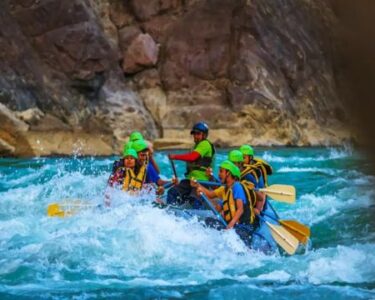Adventure travel, with its blend of thrilling experiences and immersive environments, has surged in popularity as a way to escape routine and reconnect with oneself. Beyond the physical benefits of hiking, kayaking, or climbing, adventure travel offers profound advantages for mental fitness. From reducing stress to fostering resilience, these experiences can transform how you think, feel, and navigate life’s challenges. This article explores 15 compelling reasons why adventure travel is a powerful tool for enhancing mental well-being, making it an ideal pursuit for those seeking clarity, balance, and emotional strength in 2025.
1. Escaping the Daily Grind
Adventure travel provides a much-needed break from the monotony of daily life. Stepping away from work emails, household chores, or urban chaos allows your mind to reset. Whether you’re trekking through a rainforest or zip-lining over a canyon, the shift in environment disrupts repetitive thought patterns that often lead to mental fatigue. This escape fosters a sense of freedom, giving your brain space to recharge and process emotions without the weight of routine responsibilities. The novelty of new surroundings stimulates curiosity, replacing mundane worries with a sense of wonder and excitement.
2. Reducing Stress Through Nature
Spending time in nature is a proven stress-reliever, and adventure travel often immerses you in breathtaking landscapes. Forests, mountains, and oceans have a calming effect, lowering cortisol levels and promoting relaxation. Activities like hiking in the Alps or kayaking along a serene river engage your senses, grounding you in the present moment. This connection with the natural world acts as a balm for anxiety, offering a respite from the overstimulation of modern life. The rhythmic sounds of waves or rustling leaves create a meditative atmosphere, soothing your mind effortlessly.
3. Boosting Endorphins With Physical Activity
Adventure travel is inherently active, whether you’re cycling through rugged terrains or rafting down rapids. Physical exertion triggers the release of endorphins, the body’s natural mood elevators. These feel-good chemicals combat depression and enhance feelings of happiness. Unlike repetitive gym workouts, adventure activities like rock climbing or surfing feel exhilarating rather than routine, making the mental boost even more pronounced. The combination of movement and adrenaline creates a powerful antidote to low moods, leaving you energized and uplifted long after the trip ends.
4. Enhancing Mindfulness
The unpredictable nature of adventure travel demands focus, pulling you into the present moment. Navigating a mountain trail or scuba diving among coral reefs requires full attention, leaving little room for ruminating on past worries or future uncertainties. This heightened state of awareness mirrors mindfulness practices, which are known to reduce anxiety and improve emotional regulation. By engaging with your surroundings—feeling the texture of a rock wall or listening to a waterfall—you cultivate a mental clarity that carries over into everyday life, helping you stay grounded in challenging situations.
5. Building Confidence Through Challenges
Adventure travel often involves stepping outside your comfort zone, whether it’s summiting a peak or navigating a foreign landscape. Overcoming these challenges builds self-confidence, reinforcing your belief in your abilities. Each small victory, like completing a strenuous hike or mastering a new skill like kayaking, strengthens your sense of accomplishment. This newfound confidence translates to mental resilience, empowering you to tackle personal or professional obstacles with greater assurance. The knowledge that you’ve conquered tough situations fosters a positive self-image, bolstering your mental fitness.
6. Fostering Social Connections
Many adventure travel experiences involve group activities, from guided treks to team-based challenges like rafting. These shared moments create opportunities to bond with others, fostering a sense of belonging. Human connection is vital for mental health, reducing feelings of loneliness and boosting emotional well-being. Even brief interactions with fellow travelers or local guides can spark meaningful conversations, offering fresh perspectives. The camaraderie built during a group climb or a campfire chat lingers, providing a support network that enhances your mental outlook long after the journey.
7. Stimulating Creativity
New environments and experiences ignite creativity, a key component of mental fitness. Adventure travel exposes you to unfamiliar cultures, landscapes, and challenges, sparking inspiration. Whether you’re sketching a Himalayan vista or journaling about a desert safari, these moments stimulate your imagination. Creative expression is linked to improved mood and problem-solving skills, as it allows you to process emotions and view challenges from new angles. The sensory richness of adventure—vibrant markets, starry skies, or rugged trails—fuels your mind’s ability to think outside the box, enhancing cognitive flexibility.
8. Improving Problem-Solving Skills
Adventure travel often requires quick thinking and adaptability, whether you’re navigating a tricky trail or troubleshooting a camping setup. These situations hone your problem-solving skills, strengthening mental agility. Facing unexpected challenges, like a sudden weather change or a language barrier, trains your brain to stay calm under pressure and devise solutions. This cognitive workout builds resilience, making it easier to handle stressors in daily life. The ability to think on your feet during a high-stakes activity like mountaineering translates to better decision-making in personal or professional contexts.
9. Promoting Gratitude
Immersing yourself in new cultures or awe-inspiring landscapes fosters a sense of gratitude, a powerful driver of mental well-being. Adventure travel often highlights the beauty of the world, from pristine beaches to ancient ruins, reminding you of life’s wonders. Encounters with local communities, who may live simpler lives, can shift your perspective, helping you appreciate what you have. Gratitude reduces negative emotions like envy or resentment, replacing them with contentment. Reflecting on a sunrise hike or a meaningful cultural exchange cultivates a positive mindset, enhancing your emotional resilience.
10. Encouraging Digital Detox
In a hyper-connected world, adventure travel offers a rare chance to unplug. Remote destinations, like the Amazon jungle or Himalayan peaks, often have limited Wi-Fi, encouraging a digital detox. Disconnecting from screens reduces mental clutter, allowing your brain to rest and process thoughts without constant notifications. This break from digital overstimulation lowers anxiety and improves focus. Instead of scrolling, you’re engaging with the world—listening to wildlife, feeling the wind, or sharing stories with fellow travelers. This intentional pause rejuvenates your mind, helping you return to daily life with renewed clarity.
11. Strengthening Resilience
Adventure travel inherently involves uncertainty, from unpredictable weather to physical challenges. Navigating these obstacles builds mental resilience, teaching you to adapt to adversity. Surviving a tough trek or managing a travel mishap reinforces your ability to bounce back from setbacks. This resilience is a cornerstone of mental fitness, equipping you to handle life’s ups and downs with greater ease. The confidence gained from enduring a stormy night in a tent or mastering a new skill like surfing creates a mental toughness that carries into other areas of your life.
12. Enhancing Sleep Quality
Physical activity and time in nature, both hallmarks of adventure travel, promote better sleep, a critical factor in mental health. Exhausting days spent hiking, biking, or paddling help regulate your circadian rhythm, making it easier to fall asleep and stay asleep. Exposure to natural light during outdoor adventures further aligns your body’s sleep-wake cycle. Quality sleep reduces irritability, improves mood, and sharpens cognitive function. Unlike urban vacations, which may involve late nights, adventure travel encourages restorative rest, leaving you refreshed and mentally sharp.
13. Cultivating a Sense of Purpose
Adventure travel often aligns with personal goals, whether it’s conquering a fear, exploring a new culture, or contributing to conservation efforts. This sense of purpose fuels motivation and enhances mental well-being. For example, volunteering on a wildlife expedition or learning survival skills in the wilderness gives you a mission beyond daily routines. Achieving these goals, no matter how small, provides a sense of fulfillment that combats feelings of aimlessness. The purpose-driven nature of adventure travel fosters a deeper connection to your values, strengthening your mental outlook.
14. Expanding Cultural Awareness
Traveling to new destinations exposes you to diverse cultures, broadening your worldview and enhancing mental flexibility. Interacting with locals, trying new foods, or learning about traditional practices challenges preconceptions and fosters empathy. This cultural awareness reduces stress by putting your own challenges into perspective and encouraging open-mindedness. For instance, a homestay in a remote village or a guided tour through ancient ruins can spark meaningful insights, enriching your understanding of the world. This expanded perspective strengthens emotional intelligence, a key aspect of mental fitness.
15. Creating Lasting Memories
Adventure travel generates vivid, positive memories that serve as mental anchors during tough times. The thrill of summiting a mountain, the joy of a group rafting adventure, or the serenity of a desert sunset become stories you revisit, boosting your mood. These experiences create a reservoir of happiness, countering negative thoughts and fostering optimism. Unlike material possessions, which lose their shine, the memories of adventure travel grow richer with time. Recalling these moments during stressful periods can rekindle a sense of joy and possibility, supporting long-term mental health.
Why Adventure Travel Matters in 2025
In an era of increasing stress and digital overload, adventure travel stands out as a holistic approach to mental fitness. Its blend of physical activity, nature immersion, and novel experiences addresses multiple facets of well-being, from stress reduction to cognitive growth. Unlike passive vacations, adventure travel engages your body and mind, creating lasting benefits. The global rise in wellness tourism, with adventure travel at its core, reflects a growing awareness of its mental health advantages. Whether you’re a seasoned explorer or a first-time adventurer, these experiences offer a path to a healthier, happier mind.
Choosing the Right Adventure
The beauty of adventure travel lies in its diversity, catering to various interests and fitness levels. For high-adrenaline seekers, activities like skydiving in New Zealand or white-water rafting in Costa Rica deliver intense thrills. Those seeking calm might opt for yoga retreats in Bali or slow treks in the Himalayas. Beginners can start with guided tours, such as safaris in South Africa or cycling in Tuscany, which balance adventure with support. Consider your mental health goals—whether it’s stress relief, confidence-building, or social connection—when selecting a trip. Researching reputable operators and destinations ensures a safe, fulfilling experience.
Tips for Maximizing Mental Benefits
To fully harness the mental health benefits of adventure travel, preparation is key. Choosing a destination that aligns with your interests, like mountains for solitude or beaches for vibrancy, sets the tone. Packing light and prioritizing essentials, such as comfortable gear and a journal, enhances your experience. Embracing challenges with an open mind, whether it’s a tough hike or a cultural difference, fosters growth. Staying present—through photography, meditation, or simply savoring the moment—deepens mindfulness. Finally, reflecting on your journey post-trip, perhaps by sharing stories or planning the next adventure, reinforces the mental gains.
The Future of Adventure Travel
As 2025 unfolds, adventure travel is poised for growth, driven by a focus on mental wellness and sustainable tourism. Innovations like eco-friendly expeditions and tech-enhanced experiences, such as virtual reality-guided treks, are gaining traction. Destinations are prioritizing accessibility, offering adaptive adventures for diverse abilities. The rise of solo and women-only adventure groups reflects a shift toward inclusivity, empowering more people to explore. With mental health awareness at an all-time high, adventure travel’s role in fostering resilience, creativity, and joy will only expand, making it a vital tool for well-being.
Final Thoughts
Adventure travel is more than a getaway—it’s a gateway to mental fitness. Its ability to reduce stress, boost confidence, and spark creativity makes it a transformative experience. From the thrill of conquering challenges to the peace of nature’s embrace, each adventure strengthens your mind in unique ways. By stepping into the unknown, you unlock resilience, gratitude, and a renewed sense of purpose. Whether you’re scaling a cliff or wandering a new culture, the mental benefits linger, enriching your life long after the journey ends. Embrace adventure travel in 2025, and discover the power of exploration for a healthier, happier mind.




